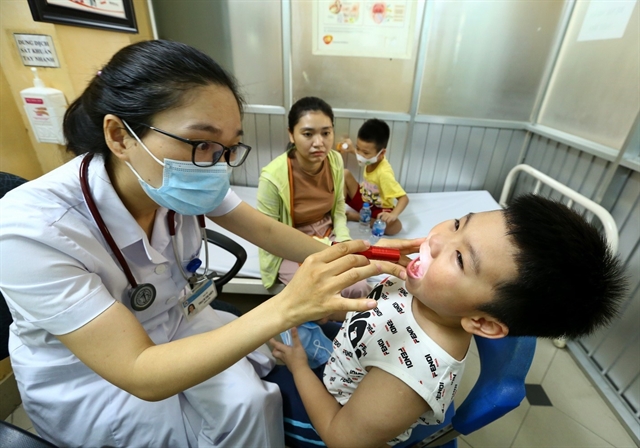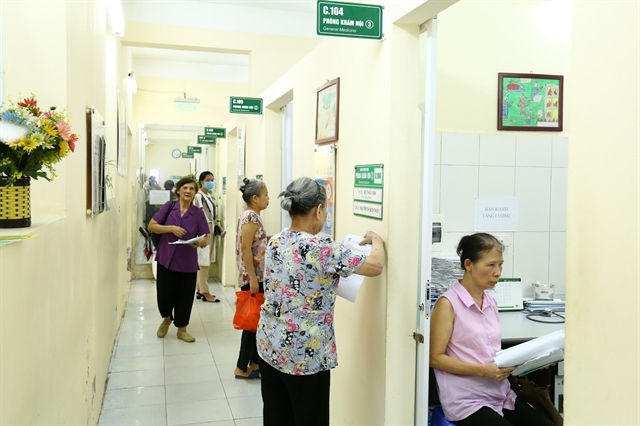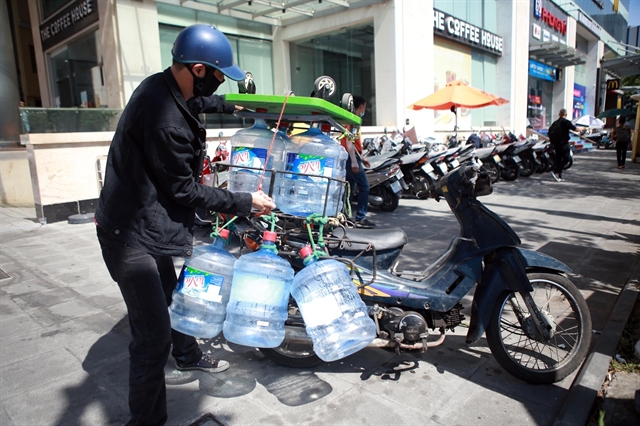 Society
Society


|
| A doctor treats a boy at the Việt Nam-Cuba Hospital's Paediatrics Department. Children are among the vulnerable groups to hot weather. — VNA/VNS Photo Minh Quyết |
HÀ NỘI — Prolonged hot weather with average temperatures of about 40 degree Celsius across the country in recent days have led to health problems and water shortages.
Health
Trần Quang Thắng, head of the Emergency Aid and Stroke Ward under the National Geriatric Hospital, said the rate of elderly people having health examinations at the hospital in June increased by 150 per cent compared with May.
On average, 30-40 people have been hospitalised per day due to reasons related to hot weather, with many of them in critical condition, he said.
Thắng said the elderly could easily have problems in hot weather because their ability to adapt to the weather was weak.
Many have underlying diseases such as heart disease, diabetes and high blood pressure, so hot weather put them at risk.

|
| Elderly people visit the Việt Nam-Cuba Hospital in Hà Nội for a check-up yesterday. The heatwave has reportedly caused elderly people health problems. — VNA/VNS Photo Minh Quyết |
At the Hà Nội-based Bạch Mai Hospital, Đào Việt Phương, a doctor from the Emergency Ward, said each day the ward received dozens of patients suffering from temperature shock or strokes. Most of them had worked outside or were elderly people with underlying conditions.
A similar situation happened at Saint Paul Hospital in Hà Nội.
The number of children going in for health examinations this month had increased by 30 per cent compared with last month.
Doctors at the hospital said that due to the COVID-19 pandemic, students must go to school instead of having a summer holiday like in previous years. Many of them have lessons in the afternoon, which means they must go to school in the heat of the day.
Dermatology
Đặng Bích Diệp, head of the Social Work Ward under the National Hospital of Dermatology and Venereology, warned that hot weather with ultraviolet (UV) rays at high levels could cause great harm to people’s skin, however, not everyone knows how to protect it properly.
UV rays can cause sunburn, harm the skin’s cells and gradually lead to skin cancer.
The time that UV rays cause the most harm is between 10am to 2pm, so people should avoid going out at that time, she said.
The hospital has treated many people suffering from sunburns, most of them people who had to work in the sun.
The patients would need several weeks to recover and serious skin pains could lead to other side effects, said Diệp.
Diệp warned that patients should be vigilant, not treat themselves and must go to the hospital for instruction from doctors.
To protect the skin, people should apply sun cream three times per day, and apply it about 20 minutes before going out.
If the sunlight is severe, the people should choose sun cream with a high sun protection factor (SPF). For instance, when going to the beach, sun cream with SPF 50+ should be chosen, said Diệp.
Measures
K Hospital, which specialises in treating cancer, has conducted different measures to ease patients’ difficulties while having health examinations during hot weather days.
Nguyễn Bá Tĩnh, head of the hospital's Welfare Work Ward, said the hospital received more than 2,000 patients for health examinations and treatment per day and many of them queued up since the early hours.
To reduce the time spent waiting in hot weather, the hospital opened three branches in Tân Triều and Tam Hiệp communes of Thanh Trì District and in Hoàn Kiếm District.
The hospital also operates a drinking water system to serve patients and their families.
Air conditioners were turned on all day in all treatment rooms so the patients would feel more comfortable, he said.
More trees had been planted around the hospital and more high-powered fans had been installed in waiting and examination rooms.
Warnings
Doctors advise that the elderly should have regular health checks and meals with enough nutrition and vitamin, while everyone should drink about two litres of water per day.

|
| A delivery man transports water during a severe heatwave in Hà Nội yesterday. People are warned to drink enough water during the hot weather to keep the body healthy. — VNA/VNS Photo Thanh Tùng |
If people have to go outside, they should have enough protective clothes and keep time in the sun to a minimum.
Trần Minh Điển, deputy director of the National Paediatrics Hospital, said if children have high temperatures, parents should bring them to hospital as soon as possible to prevent brain side effects. Children should not go out during hot days, especially between 10am and 4pm.
Water shortage
Many streams in Quảng Bình Province have run out of water in recent days, causing concern for local residents.
Ten streams in Xà Khía Village, Lâm Thủy Commune, Lệ Thủy District, which supply water for ethnic Bru-Vân Kiều minorities did not have any water due to drought.
Hồ Văn Do, a local resident, said there had been no rain for three months and residents had to travel dozens of kilometres to bring water from the forest to the village.
“Water now is as valuable as rice,” he said.
Nguyễn Thanh Hiển, principal of the Lâm Thủy Boarding School for Ethnic Minority Students, said besides teaching, teachers must go to the forest to bring cans of water for students to bathe and cook meals with.
Hướng Hóa and Đắk Rông districts of Quảng Trị Province also seriously lack water for daily use.
Hồ Vinh, 58, lives in Lìa Commune in Hướng Hóa District and said people must dredge small puddles in streams to store water.
Nguyễn Văn Dương, director of Yên Thành District Agriculture and Rural Development Division in the central province of Nghệ An, said about 1,500ha of rice in the district could not be cultivated due to water shortages. Hundreds more hectares of cultivated rice could die if the hot weather lasts long.
One more problem caused by hot weather is forest fires.
Nguyễn Mạnh Cường, deputy director of the Nghệ An Forest Management Department, said the risk for forest fires was at level five – the highest level. Inspectors must be on duty all day round to minimise losses from fires.
In the central province of Quảng Ngãi, more than 6,600ha of plants suffered from drought and more than 7,400 people lack water for daily use. — VNS